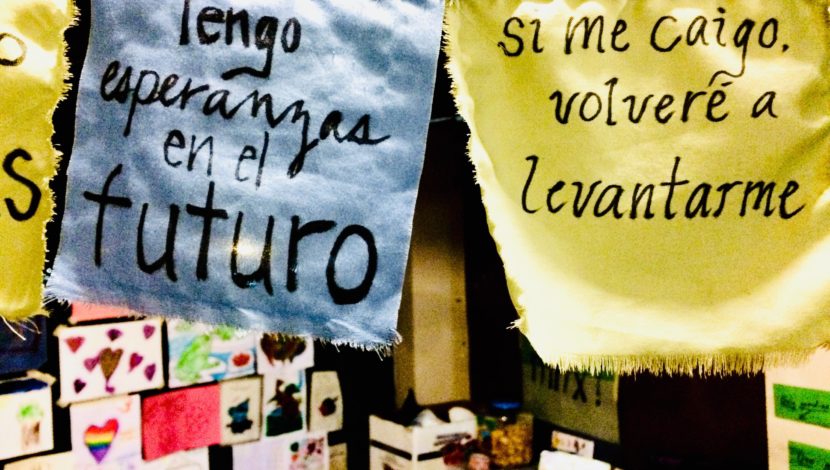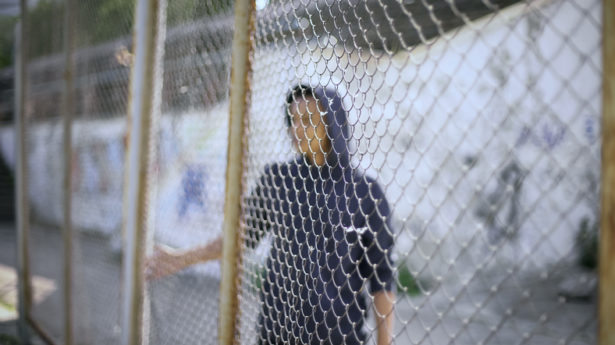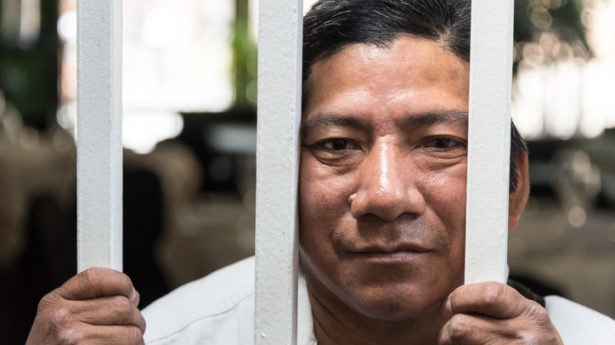The Unitarian Universalist Service Committee advances human rights through grassroots collaborations.
Bearing Witness to the Plight of Migrants on the Mexico Border

By Donald Thornberry on July 25, 2019
Through the UU College of Social Justice, UU member Donald Thornberry joined UUSC partner, Al Otro Lado, as one of their volunteers at Tijuana, Mexico. The following is his recollection of his trip.
When I first walked across the border separating San Ysidro, California from Tijuana, Mexico, I had little idea of what to expect. I was heading to an afternoon orientation session for volunteers with Al Otro Lado (AOL), a binational organization supported by UUSC providing free legal services to asylum-seekers. I traveled from Sacramento, where I’m a member of the Unitarian Universalist Society of Sacramento.
That first afternoon, I met volunteers from the United States, Canada, Mexico, Argentina, and South Korea. Some were academic or private-practice immigration lawyers; others were teachers, professors, or students on summer break.
Every day starting at 7 a.m., AOL staff and volunteers reach out to newly-arrived migrants. The migrants are gathered in a queue on one side of the entry plaza, either to get a new number from the immigration metering list (to officially get them “in line” to present their case) or to listen for their name to be called from the list. If their name is called, they will be loaded into a small van and driven to the port of entry where they will present themselves to U.S. Customs and Border Patrol (CBP) officials. Each number represents 10 people or families. On June 9, the last number given out was 3,361. The last name called over the bullhorn that day was from group 2,634, so the gap between the numbers is 727. Since each number represents 10 people or families, as of June 9, at least 7,270 people were waiting somewhere in Tijuana to legally cross the border. On any given day, only 15 to 35 people or families are permitted to do so.
There is no information posted nearby to inform a newly-arrived migrant about what is happening here. The number allowed to pass varies daily, but at this rate the wait is at least three to four months and growing. The AOL volunteers pass out fliers in many languages about our afternoon workshops, offered Monday through Friday within walking distance of El Chaparral, the hub for AOL activities. These workshops offer migrants an understanding of the bewildering system of restrictions and delays that they face, as well as their rights and how to exercise them.
At 10 a.m. the volunteers and staff meet at the AOL office to begin preparation for the workshops. These begin with general information on the American asylum process, followed by a chance to prepare for a credible fear interview, and an opportunity to talk one-on-one with an American immigration lawyer. Food and childcare are provided, and most importantly, a chance to create a private online archive of scanned, digitalized images of critical documents, such as passports, visas, and anything that supports an asylum claim. There are also meetings for clients in the Remain in Mexico program (where migrants present to CBP and return to Tijuana to await a future date with a U.S. immigration court) and most vulnerable population members (such as people with medical problems or who are LGBTQ or pregnant).
The first day I volunteered, we met 55 clients from 11 countries. Most were from Central America or Mexico, fleeing the breakdown of civil authority, but there were also English speakers from Cameroon, Creole and French speakers from Haiti, a few Russian speakers, and even a Mandarin speaker. The workshops end daily between 5 and 6 p.m., and then we prepare for the next day.
I spent a week volunteering with AOL and meeting scores of migrants. On my final day walking north to the border, I passed the migrant line and saw familiar faces, both among the migrants and those offering assistance. I stopped to take a quick selfie with my new friend Rogelio, a Tijuana ex-gang member and born-again Christian whom I grew fond of. Returning to the United States, along the long, enclosed elevated walkway, over rows of steel fencing and piles of razor wire, I exited near a shopping mall within shouting distance of the migrant line. I made another effort to imagine myself in a migrant’s place, trying to navigate this final step to American soil after what for most has been a journey of months, over several continents, and countless dangers. I couldn’t do it.
Photo Credit: Donald Thornberry
***
About UUSC: Guided by the belief that all people have inherent worth and dignity, UUSC advances human rights globally by partnering with affected communities who are confronting injustice, mobilizing to challenge oppressive systems, and inspiring and sustaining spiritually grounded activism for justice. We invite you to join us in this journey toward realizing a better future!

